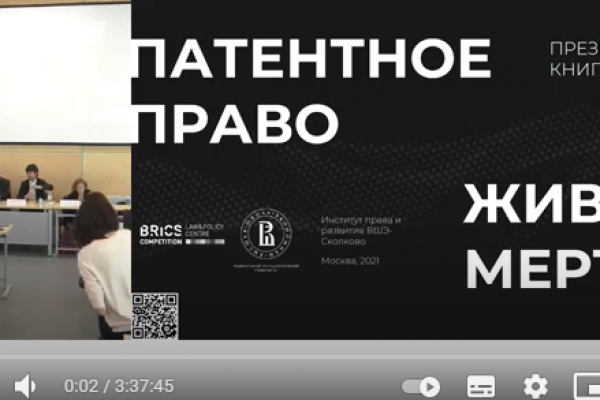On May 28, the Faculty of Law of the Higher School of Economics-St. Petersburg hosted the presentation of the book "Patent Law Alive and Dead" by the BRICS Competition Law and Policy Centre and the HSE-Skolkovo Institute of Law and Development and a round table of the same name. The event was attended by:
- Sergey Belov, Dean, Faculty of Law, St. Petersburg State University
- Gadis Gadzhiev, Judge of the Constitutional Court of the Russian Federation
- Alexey Ivanov, Director, HSE-Skolkovo Institute of Law and Development, BRICS Competition Law and Policy Centre
- Elena Voinikanis, Senior Researcher, BRICS Competition Law and Policy Centre
- Vladimir Sivitsky, Head of the Secretariat, Constitutional Court of the Russian Federation
- Timofey Nizhegorodtsev, Deputy Head, FAS of Russia
- Anton Ivanov, Research Supervisor, HSE Faculty of Law
- Bjorn Landqvist, Associate Professor, Stockholm University, Senior Researcher, BRICS Competition Law and Policy Centre
- Valentina Sinelnikova, Professor of the Department of Private Law, HSE Faculty of Law
- Anatoly Semenov, Deputy Chairman of the RSPP Committee on Intellectual Property and Creative Industries
Alexey Ivanov, Director of BRICS Competition Law and Policy Centre, opened the event and noted that:
"Our patent law is very much ossified, there are a lot of dead pieces in it, which have become immobile dogmas. The purpose of the book is to initiate an important transformation of patent law."
Gadis Gadzhiev, judge of the Constitutional Court of the Russian Federation, stressed that the publication of the book “Patent Law Alive and Dead” is a breakthrough in modern jurisprudence.
"In Russia, there are still institutions that protect the interests of foreign rights holders, but at the same time damage local producers. The book provides an insight into what intellectual property law truly is. Our understanding of intellectual property law differs from how it is viewed in other countries, which is why I recommend everyone to read this book".
Anton Ivanov, Academic advisor of the HSE Faculty of Law, noted that patent law has undergone significant changes in recent years. At the same time, socio-economic incentives for inventors have now disappeared with full regulation.
“The merging of copyright and patent law is taking place, modern approaches show that the mixing of copyright and patent law is promising. Patent protection is very complex and does not provide the necessary portability. And in the near future, the question of how to protect products created by artificial intelligence will arise".
Elena Voinikanis, a leading researcher at the BRICS Competition Law and Policy Centre, stressed that in the book “Patent Law Alive and Dead”, the authors tried to combine two sides of the coin: criticism and strategy for future positive changes in patent law. Sometimes patents are used not for the development of innovations, but solely to eliminate competitors, and it is necessary to fight this. Economic analysis helps to assess the situation carefully and restore the lost pragmatism to intellectual property, even in the most difficult cases. E. Voinikanis noted that the modern economy has not come to an unambiguous conclusion about the benefits or harms of patents – everything depends on a specific industry, country, features of the economy, including the business strategies of individual companies.
“The patent system should act in such a way as to ensure a balance between the interests of copyright holders, technology users and society".
In conclusion, Valentina Sinelnikova, Professor of the Department of Private Law at the HSE Faculty of Law and reviewer of the book “Patent Law Alive and Dead”, noted that the book is a multidimensional study in which experts from various fields participated. The main idea of the book is that it is necessary to develop a unified concept of patent law. However, as noted in the book, a simple restriction of patent rights will not solve all the problems, the objects of the patent sphere of regulation are also living subjects. At the same time, new problems of existence arise in our society – economic, ethical, genetic.
“The right to be an author remains important, at the present stage, the basis of everything is a person, and authors need protection".
The book is dedicated to finding answers to questions about what patent law should be in order to stimulate innovation and benefit society in the context of the digital transformation of the economy. Patent law is explored by the authors in its complex relationship with global trade, economic policy, new technologies and disruptive innovations. The contextual approach allowed to re-build the argumentation and rethink the problems and challenges facing patent regulation today.
